Articles
- Page Path
- HOME > J Korean Acad Nurs > Volume 43(1); 2013 > Article
-
Original Article
- Effects of the Family Resilience Enhancement Program for Families of Patients with Chronic Schizophrenia
- HeeSu Lim, KuemSun Han
-
Journal of Korean Academy of Nursing 2013;43(1):133-142.
DOI: https://doi.org/10.4040/jkan.2013.43.1.133
Published online: February 28, 2013
1Department of Nursing, Suwon Women's College, Suwon, Korea.
2College of Nursing, Korea University, Seoul, Korea.
- Address reprint requests to: Han, KuemSun. College of Nursing, Korea University, Anam-dong, Sungbuk-gu, Seoul 136-705, Korea. Tel: +82-2-3290-4919, FAX: +82-2-927-4676, hksun@korea.ac.kr
© 2013 Korean Society of Nursing Science
Abstract
-
Purpose
- The purpose of this study was to evaluate the effects of the Family Resilience Enhancement Program (FREP) on family hardiness, family sense of coherence, family problem solving communication, family crisis oriented personal evaluation, and adaptation in families of patients with chronic schizophrenia.
-
Methods
- The study design was a nonequivalent control group prepost test design. Study participants were 17 families in the experimental group and 17 in the control group. Ten sessions of FREP were provided over 5 weeks. The data were analyzed using SPSS 15.0.
-
Results
- There were statistically significant differences in family hardiness, family sense of coherence, family problem-solving communication, family crisis-oriented personal evaluation, social resources, and family adaptation between the experimental group and the control group.
-
Conclusion
- FREP based on the family resilience model developed in this study, shows the effect of leading the families to positive family adaptation.
This manuscript is a condensed form of the first author's doctoral dissertation from Korea University.
- 1. Ahn YH. Family resilience: Implications for nursing practice. Korean J Nurs Query. 2006;15(1):5–24.
- 2. Anderson CM, Hogarty GE, Reiss DJ. Family treatment of adult schizophrenic patients: A psycho-educational approach. Schizophr Bull. 1980;6(3):490–505. http://dx.doi.org/10.1093/schbul/6.3.490.ArticlePubMed
- 3. Antonovsky A, Sourani T. Family sense of coherence and family adaptation. J Marriage Fam. 1988;50(1):79–92. http://dx.doi.org/10.2307/352429.Article
- 4. Bernheim KF. Supportive family counseling. Schizophr Bull. 1982;8(4):634–641. http://dx.doi.org/10.1093/schbul/8.4.634.Article
- 5. Chung SA, Yang S. The effects of solution-focused group counseling program for the families with schizophrenic patients. J Korean Acad Nurs. 2004;34(7):1155–1163.ArticlePDF
- 6. Faul F, Erdfelder E, Buchner A, Lang AG. Statistical power analyses using G*Power 31: Tests for correlation and regression analyses. Behav Res Methods. 2009;41(4):1149–1160. http://dx.doi.org/10.37 58/brm.41.4.1149.ArticlePubMedPDF
- 7. Han KS. Health promoting behavior of the family care-giver in the patients with chronic mental disorders. J Korean Acad Psychiatr Ment Health Nurs. 2005;14(3):268–275.ArticlePDF
- 8. Han KS, Kim YJ, Lee PS, Lee SJ, Park ES, Park YJ, et al. Construct a structural model for family function of the family with chronic mental disorder. J Korean Acad Psychiatr Ment Health Nurs. 2004;13(2):146–155.ArticlePDF
- 9. Harrison CA, Dadds MR, Smith G. Family caregivers' criticism of patients with schizophrenia. Psychiatr Serv. 1998;49(7):918–924.ArticlePubMed
- 10. Kim HJ. The Study of stress coping methods through the family functions. 2002;Seoul, Ewha Womans University. Unpublished master's thesis.
- 11. Kobasa SC, Maddi SR, Kahn S. Hardiness and health: A prospectivestudy. J Pers Soc Psychol. 1982;42(1):168–177. http://dx.doi.org/10.1037/0022-3514.42.1.168.ArticlePubMed
- 12. Lee EH. A study on the level of family adaptation to schizophrenic patients: An application of the family resiliency model. Korean J Soc Welf. 2000;41:173–200.
- 13. Lee IS. Effectiveness and development of family psycho-education program for improving of family resilience-targeted the family with mental illness children. J Fam Relat. 2004;9(2):221–239.
- 14. Lee SA. The influence of the family resilience with the family of chronic illness child on family adaptation. 2004;Busan, Pusan National University. Unpublished doctoral dissertation.
- 15. Lee YA. Family health: Research on family health; A study of perceived family adaptation in patients with chronic renal failure. Korean J Nurs Query. 1995;4(2):147–164.
- 16. Lee YH, Shim JC, Lee SG, Seo YS, Kim YK, Kim KS, et al. Effect of a psychoeducational family therapy model for the families of schizophrenic patients. J Korean Neuropsychiatr Assoc. 2000;39(3):479–494.
- 17. McCubbin HI, Olson DH, Larsen AS. McCubbin HI, Thompson AI. F-COPES: Family crisis oriented personal evaluation scales. In: Family assessment inventories for research and practice. 1981;Madison, WI, University of Wisconsin. 195–207.
- 18. McCubbin HI, Patterson J, Glynn T. McCubbin HI, Thompson AI, McCubbin MA. Social support index (SSI)(1982). In: Family assessment: Resiliency, coping and adaptation-Inventories for research and practice. 1996;Madison, WI, University of Wisconsin System. 357–389.
- 19. McCubbin HI, Patterson JM, Larsen AS, Olson DH, Glynn T, McCubbin MA. McCubbin HI, Thompson AI, McCubbin MA. Social support index (SSI). In: Family assessment: Resiliency, coping and adaptation: Inventories for research and practice. 1982;Medison, WI, University of Wisconsin System. 357–390.
- 20. McCubbin HI, Thompson AI, McCubbin MA. McCubbin MA, McCubbin HI, Thompson AI. Family assessment: Resiliency, coping and adaptation-inventories for research and practice. In: Family problem-solving communication (FPSC). 1996;Madison, WI, University of Wisconsin System. 103–178.
- 21. McCubbin MA, McCubbin HI. Danielson CB, Hamel-Bissell B, Winstead-Fry P. Families coping with illness: The resiliency model of family stress, adjustment, and adaptation. In: Families, health, and illness: Perspectives on coping and intervention. 1993;St. Louis, MO, Mosby. 21–63.
- 22. McCubbin MA, McCubbin HI, Thompson AI. McCubbin HI, Thompson AI, McCubbin MA. Family hardiness index (FHI). In: Family assessment: Resiliency, coping and adaptation: Inventories for research and practice. 1986;Madison, WI, University of Wisconsin System. 239–305.
- 23. McCubbin MA, McCubbin HI, Thompson AI. McCubbin HI, Thompson AI, McCubbin MA. Family problem-solving communication (FPSC). In: Family assessment: Resiliency, coping and adaptation-inventories for research and practice. 1988;Madison, WI, University of Wisconsin System. 639–686.
- 24. Min HS. The development and application of family resiliency improvement program for improving family adaptation of person with brain injury. 2007;Busan, Kyungsung University. Unpublished doctoral dissertation.
- 25. Olson DH, Portner J, Lavee Y. FACES-III. 1985;St. Paul, MN, Family Social Science, University of Minnesota.
- 26. Satir V, Baldwin M. Satir step by step: A guide to creating change in families. 1983;Palo Alto, CA, Science and Behavior Books.
- 27. Seo HH, Hah YS. The effect of family psychoeducation on knowledge and caregiving experience for the family with schizophrenic patient. J Korean Acad Psychiatr Ment Health Nurs. 2003;12(4):565–575.
- 28. Seomun GA. Development of family with elderly dementia patient adaptation model. 2000;Seoul, Yonsei University. Unpublished doctoral dissertation.
- 29. Song YS. The effect of the communication training program on interpersonal relationship improvement for families of chronic mentally ill patients. J Korean Acad Psychiatr Ment Health Nurs. 1999;8(1):134–142.ArticlePDF
- 30. Walsh F. Family resilience: A framework for clinical practice. Fam Process. 2003;42(1):1–18. http://dx.doi.org/10.1111/j.1545-5300.2003.00001.x.ArticlePubMed
- 31. Yang S, Jang MH. Awareness of need and degree of participation for the role of family members as psychiatric patients treatment partners, and the burden in chronic mentally ill patients' family. J Korean Acad Psychiatr Ment Health Nurs. 2000;9(1):94–111.ArticlePDF
REFERENCES
Figure & Data
REFERENCES
Citations

- A Review on the Components and Improvements of Gatekeeper Training: Focusing on Family Intervention of People With Mental Illness
Deuk-Kweon You, Tae-Yeon Hwang
Journal of Korean Neuropsychiatric Association.2024; 63(2): 96. CrossRef - Effectiveness of Gatekeeper Training for Families of People With Mental Disorders in Korea: A Randomized Controlled Trial
Deuk-Kweon You, Jeoung-Mo Son, Tae-Yeon Hwang
Psychiatry Investigation.2023; 20(12): 1185. CrossRef - Family Resilience Scale Short Form (FRS16): Validation in the US and Chinese Samples
Tak Sang Chow, Catherine So Kum Tang, Tiffany Sok U. Siu, Helen Sin Hang Kwok
Frontiers in Psychiatry.2022;[Epub] CrossRef - A randomized controlled trial of a coping-focused family resilience intervention program for breast cancer patients: Study protocol
Jie Gao, Jia-Xin Li, Wei-Ying Chen, Jiang-Yan Song, Meng-Ke Zhou, Shan-Shan Zhang, Hui-Ping Li
Frontiers in Psychology.2022;[Epub] CrossRef - Effects of cultural adaptation resilience promotion program for mothers-in-law in multicultural families
Sang-Hwa Lee, Dong-Hee Kim, Kyoungrim Kang, Omnia Samir El Seifi
PLOS ONE.2022; 17(9): e0274224. CrossRef - The mediating role of sense of coherence on mental health outcomes in carers of older dependent relatives: A longitudinal study
Catalina López‐Martínez, Vasiliki Orgeta, Antonio Frías‐Osuna, Rafael del‐Pino‐Casado
International Journal of Geriatric Psychiatry.2021; 36(5): 722. CrossRef - Suffering Experience of Primary Caregivers of People with Mental Disabilities in Community Dwellings
Eun Joung Choi, Hyun Mee Cho, Eun Ju Cho, Minkyung Lee
Journal of Korean Academy of psychiatric and Mental Health Nursing.2020; 29(3): 218. CrossRef - The mediating effect of resilience on the relationship between Type D personality and self‐care behavior in patients with heart failure
Ji Min Heo, Chul‐Gyu Kim
Japan Journal of Nursing Science.2020;[Epub] CrossRef - Review of Group Family Psychoeducation for Schizophrenia and Recommendation of Program Applicable to Korean Situation
Soo-Hyun Paik
Journal of Korean Neuropsychiatric Association.2020; 59(3): 215. CrossRef - Developing a Prediction Model for Family Health in Families of Patients with Schizophrenia
Kuem Sun Han, Yeong Seon Hong, Hyuncheol Kang, Youn Hee Roh, Myung Sook Choi, Hee Jin Moon
Journal of Korean Academy of Psychiatric and Mental Health Nursing.2019; 28(4): 309. CrossRef - Association between Sense of Coherence and Mental Health in Caregivers of Older Adults
Catalina López-Martínez, Natalia Serrano-Ortega, Sara Moreno-Cámara, Rafael del-Pino-Casado
International Journal of Environmental Research and Public Health.2019; 16(20): 3800. CrossRef - Sense of coherence, burden and mental health in caregiving: A systematic review and meta-analysis
Rafael del-Pino-Casado, Aída Espinosa-Medina, Catalina López-Martínez, Vasiliki Orgeta
Journal of Affective Disorders.2019; 242: 14. CrossRef - The development of a family resilience‐strengthening programme for families in a South African rural community
Serena Ann Isaacs, Nicolette V. Roman, Shazly Savahl
Journal of Community Psychology.2018; 46(5): 616. CrossRef - The Mediating Effect of the Resilience on the Relationship between Type D Personality and Compliance in Patients with Coronary Artery Disease
Mi Young Cheon, Jiyeon Kang
Korean Journal of Adult Nursing.2016; 28(1): 61. CrossRef - Effect of the Family Resilience Reinforcement Program for Family Caregivers of the Elderly with Dementia
Miran Bang, Oksoo Kim
Korean Journal of Adult Nursing.2016; 28(1): 71. CrossRef - The Mediating Effects of Resilience between Symptom Experience and Depression in Patients with Chronic Obstructive Pulmonary Disease
Kyoung-Ran Kong, Eun-Nam Lee
Korean Journal of Adult Nursing.2015; 27(4): 375. CrossRef
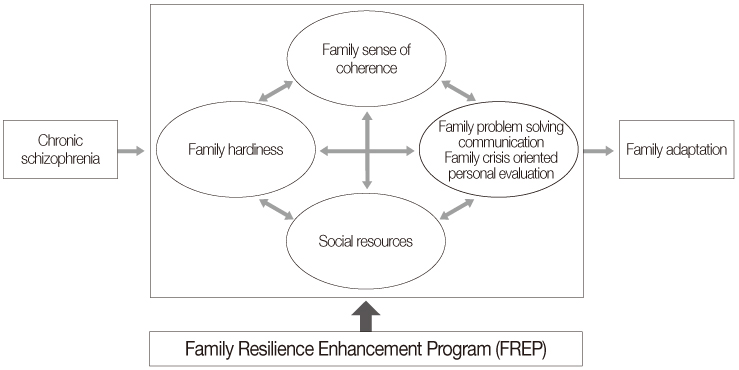
Figure 1
Contents of Family Resilience Enhancement Program
Homogeneity Test of General Characteristics (N=34)
*Fisher's exact test.
Exp.=Experimental group; Cont.=Control group.
Homogeneity Test of Family Hardiness, Family Sense of Coherence, Family Problem Solving Communication, Family Crisis Oriented Personal Evaluation, Social Support and Family Adaptability (N=34)
Exp.=Experimental group; Cont.=Control group.
Comparison of Scores between Pretest and Posttest for the Two Groups (N=34)
Exp.=Experimental group; Cont.=Control group.
*ANCOVA with pretest value as covariate.
*Fisher's exact test. Exp.=Experimental group; Cont.=Control group.
Exp.=Experimental group; Cont.=Control group.
Exp.=Experimental group; Cont.=Control group. *ANCOVA with pretest value as covariate.
 KSNS
KSNS
 E-SUBMISSION
E-SUBMISSION

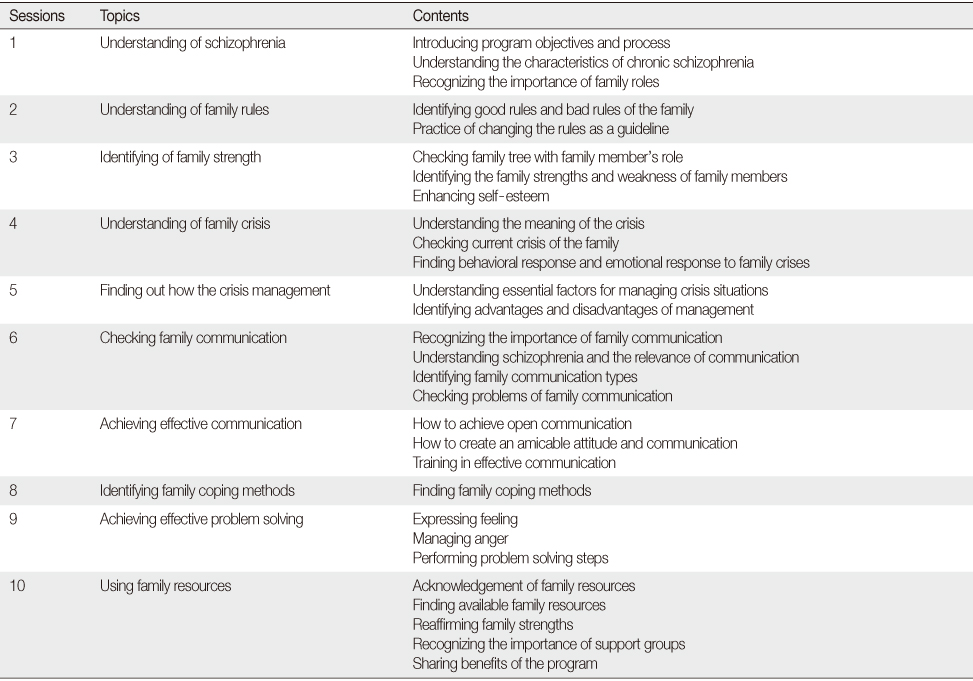
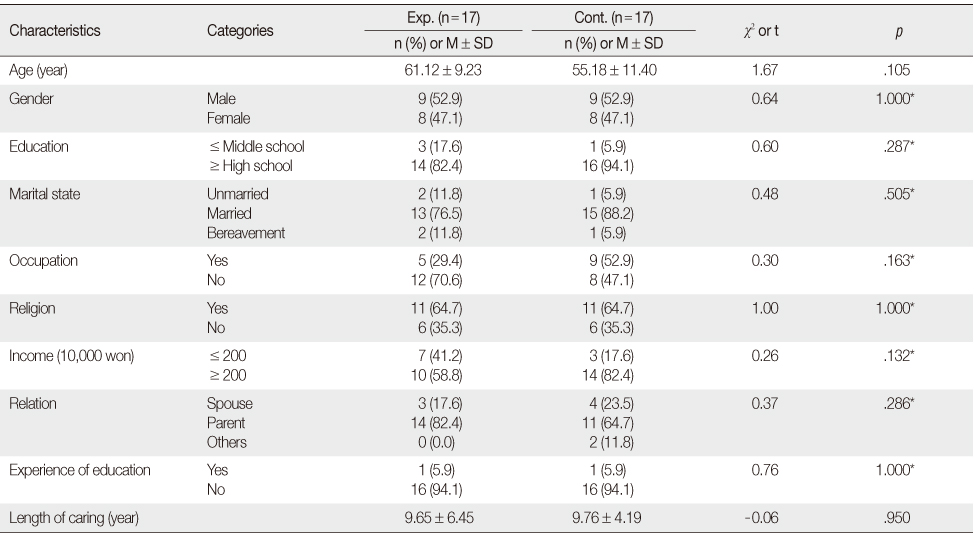
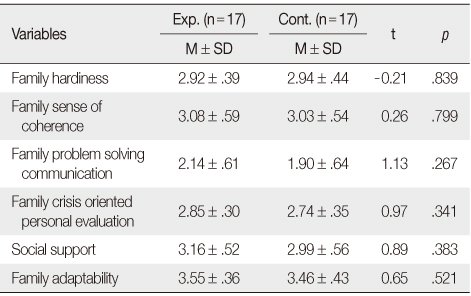
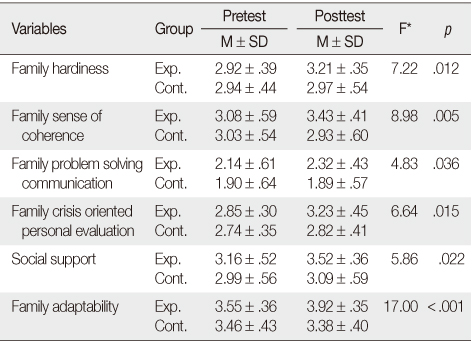
 Cite
Cite

